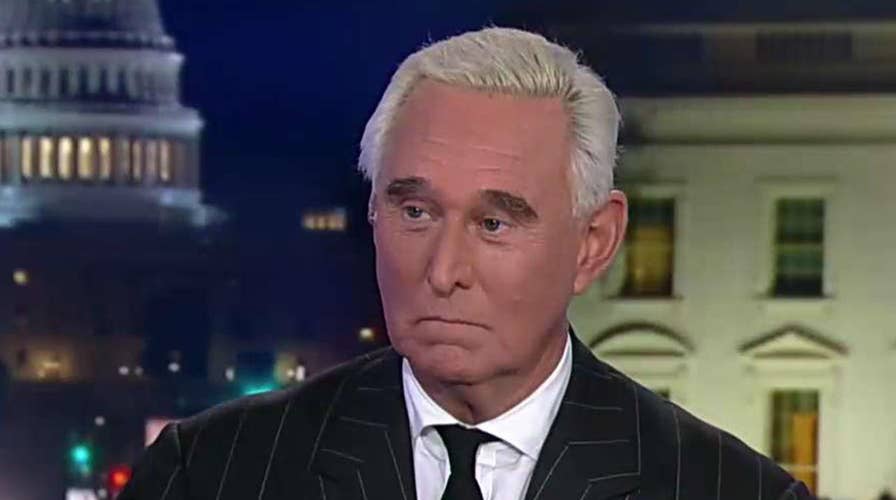A federal judge on Friday issued a partial gag order in the criminal case of former Trump political adviser Roger Stone as part of Special Counsel Robert Mueller’s investigation.
Judge Amy Berman Jackson of the federal court for the District of Columbia on Friday ordered that Stone “refrain from making statements to the media or in public settings that pose a substantial likelihood of material prejudice to this case,” according to the court filing.
ROGER STONE PLEADS NOT GUILTY TO MUELLER CHARGES IN FEDERAL COURT
Jackson further ordered that any participants in the case, including witnesses and counsel, “refrain” from making any statements to the media or public when they are near the courthouse that could “influence any juror, potential juror, judge, witness or court officer or interfere with the administration of justice.”
"There will be no additional restrictions imposed on the defendant's public statements or appearances at this time, although this order may be amended in the future...if necessary," Jackson said in a court order. "This order should not be interpreted as modifying or superseding the condition of the defendant's release that absolutely prohibits him from communicating with any witness in the case, either directly or indirectly. Nor does this order permit the defendant to intimidate or threaten any witness, or to engage or attempt to engage in any conduct in violation of [U.S. Code.]"
She added: "Finally, while it is not up to the Court to advise the defendant as to whether a succession of public statements would be in his best interest at this time, it notes that one factor that will be considered in the evaluation of any future request for relief based on pretrial publicity will be the extent to which the publicity was engendered by the defendant himself."
Stone, who last month pleaded not guilty to obstruction of justice, witness tampering, and making false statements to Congress after being indicted last month as part of Mueller’s probe, was also ordered not to travel anywhere other than Washington, the Eastern District of New York, and the Southern District of Florida while the case is pending. Stone is not permitted to have a passport in his possession or apply for any new passport. Stone was also ordered to return to court “whenever required.”
Stone, 66, was taken into custody last month after being indicted by a federal grand jury a day earlier as part of Mueller’s investigation into alleged Russian meddling and potential collusion with Trump campaign associates in the 2016 presidential election. More than a dozen FBI agents arrived in tactical gear outside of Stone’s home.
Following his arrest, Stone made several media appearances and comments about the case on his social media accounts.
The 24-page indictment released last month alleges that Stone worked to obstruct the House Intelligence Committee’s investigation into Russian interference in the 2016 election by making false statements to the committee, denying he had records sought by the committee and persuading a witness to provide false testimony.
The indictment does not charge Stone with conspiring with WikiLeaks, the anti-secrecy website that published the emails, or with Russian officers Mueller says hacked them. Instead, it accuses him of witness tampering, obstruction, and false statements about his interactions related to WikiLeaks.
Stone served as an adviser to Trump for years before Trump ran for president. He left Trump’s campaign in August 2015, but maintained regular contact with and publicly supported the Trump campaign throughout the 2016 presidential election.
FBI'S SHOW OF FORCE IN ROGER STONE ARREST SPURS CRITICISM OF MUELLER TACTICS
Jackson, who presided over the case of former Trump campaign chairman Paul Manafort, also imposed a gag order in that criminal case as part of Mueller's probe.
Mueller’s investigation, which was initially ordered to look into the 2016 election, has gone on for more than a year and a half. It has expanded to probe financial crimes of Trump associates before the election, conversations Trump’s national security adviser had with the Russians during the transition and whether Trump obstructed justice with his comments and actions related to the probe.
Twenty-six Russian nationals and three Russian companies have been charged with interfering in the 2016 presidential election. But none of the Trump associates have been charged with crimes related to collusion.
Other convictions include former national security adviser Michael Flynn and former campaign adviser George Papadopoulos, who both pleaded guilty to making false statements in 2017. Former campaign adviser Rick Gates in 2018 pleaded guilty and former campaign chairman Paul Manafort was convicted and later pleaded guilty in a separate financial crimes case dating back before the 2016 election.
Former Trump lawyer Michael Cohen pleaded guilty to making false statements in a case brought by Mueller in November. Alex van der Zwaan, a London-based lawyer, pleaded guilty to making false statements this year, and Richard Pinedo, a California man, pleaded guilty to identity fraud in 2018.























